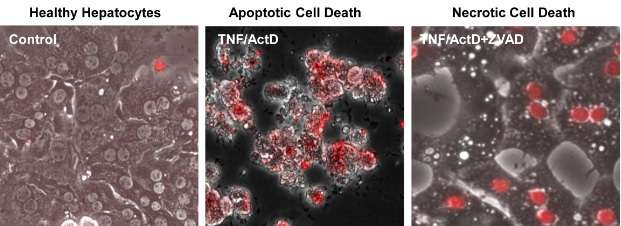New study questions the safety of caspase inhibitors for the treatment of liver disease

Many acute and chronic liver diseases, including alcoholic hepatitis, result from apoptotic (programmed) cell death mediated by the enzyme caspase. Caspase inhibitors have therapeutic potential to treat and prevent apoptosis-mediated liver injury, and some are currently in clinical trials. However, a new study published in The American Journal of Pathology raises serious safety concerns regarding the clinical use of caspase inhibitors by demonstrating the occurrence of delayed-onset necrotic, non-caspase-dependent liver cell injury.
"Our data suggest that one should be cautious in treating apoptotic cell death just with caspase inhibitors as, despite their efficacy in preventing apoptosis, these inhibitors may trigger necrotic cell death," noted Wen-Xing Ding, PhD, Associate Professor, Department of Pharmacology, Toxicology and Therapeutics of The University of Kansas Medical Center (Kansas City). "The failure to protect against endotoxin-induced liver injury raises concerns on the clinical use of caspase inhibitors."
Liver health and injury depend upon a complex interaction between physiological processes affecting cell survival and death. "A liver cell can die in many different ways, but caspase-dependent apoptosis and caspase-independent necrosis are the predominant cell death pathways that contribute to liver injury," explained Dr. Ding.
Researchers investigated endotoxin and tumor necrosis factor (TNF)-α-induced cell death in cultured hepatocytes and in mouse livers, similar to certain acute human hepatitis and liver failure. Apoptotic cell death is associated with many human liver diseases such as alcoholic hepatitis and nonalcoholic steatohepatitis (NASH). In this study, the researchers found that blocking apoptosis can trigger alternative necrotic cell death.
Apoptotic cell death was caused by TNF-α/actinomycin D (ActD) after 24 hours in primary cultured mouse hepatocytes. Adding the caspase inhibitor ZVAD blocked early apoptotic cell death but revealed the presence of necrotic cell death at 48 hours. Researchers also found that the TNF-ZVAD-induced necrosis was not due to autophagy. More importantly, researchers also confirmed these cell culture findings in an endotoxin-induced liver injury mouse model. Although blocking caspase protected against endotoxin-induced liver injury at an early time point (six hours), this protection was lost after 24 hours due to the switch of liver cell apoptosis to necrosis.
According to Dr. Ding, "We still don't know the mechanism underlying caspase inhibitor-induced necrosis of the liver. Nevertheless, our findings raised concerns about the safety of the current ongoing clinical trials using the caspase inhibitors."
This study provides important insights on the inter-relationship of different types of cell death: apoptosis, necrosis, and autophagy. Apoptosis refers to the death of apoptotic cells that still maintain relative cell membrane integrity without inflammation under physiological and pathological conditions. Apoptosis often occurs during an organism's growth or development. Necrosis refers to the cell death of necrotic cells characterized by rupture of plasma membranes and release of intracellular contents, which are associated with inflammation. Necrosis often occurs under harsh conditions, severe tissues injury, or organ blood supply failure. Autophagy is a conserved lysosomal degradation pathway that regulates homeostasis of proteins and organelles in hepatocytes and plays a critical role in normal liver physiology and liver diseases. However, under certain conditions, excessive activated autophagy may also cause cell death.
More information: "Caspase inhibition prevents tumor necrosis factor-α-induced apoptosis and promotes necrotic cell death in mouse hepatocytes in vivo and in vitro," DOI: 10.1016/j.ajpath.2016.06.009
















